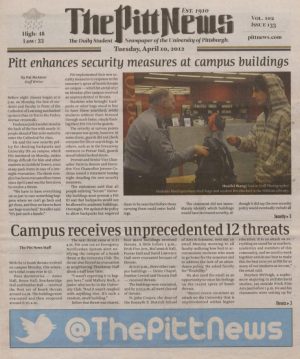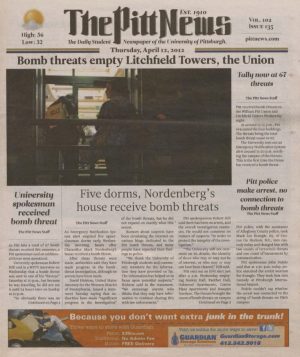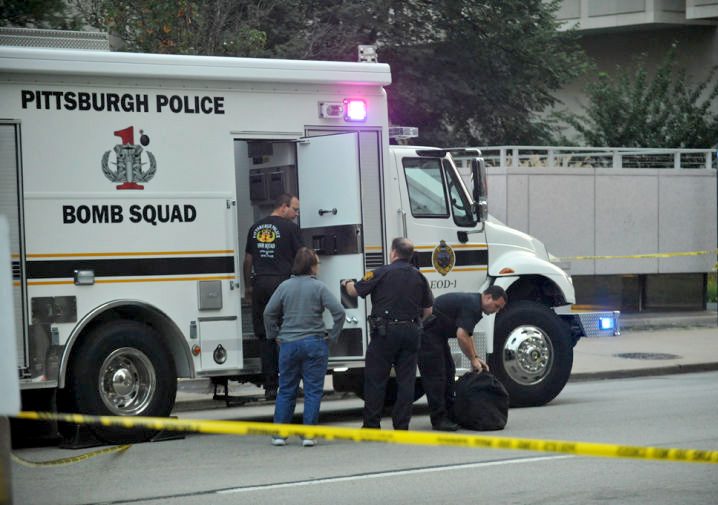‘Really came together’: Pitt community reflects on 2012 bomb threats
Members of the City and Pitt police stand by a bomb squad truck on Forbes Avenue.
March 15, 2022
A constant stream of alert notifications, blaring alarms and security guards pounding on doors constantly woke Maria Wolfe during spring 2012. Security guards frequently evacuated thousands of students like Wolfe from their dorms at all times of the day and night — sometimes as early as 3 a.m. — and from other campus buildings due to hundreds of bomb threats aimed at the University.
“When they started calling bomb threats to the dorms, that’s when it took a turn for the worst,” Wolfe, who graduated in 2015 with a psychology degree, said. “So not only were we in the middle of finals week without consistent class schedules, we’re getting woken up at all hours of the night.”
According to David Hickton, who served at the time as U.S. Attorney for the western district of Pennsylvania, more than 100 bomb threats disrupted the spring semester 10 years ago, before finally ending on April 21, 2012. The threats targeted dozens of buildings and led to hundreds of evacuations. Threats also targeted other schools, including California University of Pennsylvania, Point Park University and the nearby Western Pennsylvania School for the Blind.
Adam Busby – a man from Dublin, Ireland, with no connection to Pitt – was later indicted on Aug. 15, 2012, and charged with emailing dozens of bomb threats about Pitt to both the University and various media outlets, such as the Pittsburgh Post-Gazette.
Mark Nordenberg, who at the time served as Pitt’s chancellor, said the semester was a “very intense period” because the threats came almost daily with “accelerated impact.” He said it was a “tough time,” as he was responsible for the physical safety of thousands of people.
“At the start, there would be an anonymized bomb threat that would come in and it would affect one office or academic building during the work day. Then they started to affect more than one building,” Nordenberg said. “Then they started sending the threats targeting residence halls in the middle of the night. And so the impact kept accelerating.”
Nordenberg also said he received “great cooperation” from law enforcement, including the FBI, City police, U.S. attorney and a canine officer, to conduct searches when needed. He said the City told him they’d help with “whatever he needed.”
“Symbolically, that was a wonderful sign of the way that people, even from off campus, were pulling together and trying to do everything they could for Pitt and Pitt students,” Nordenberg said.
Hickton said there was opposition from law enforcement partners about him getting involved with the case. He said his team was unsure if it was in federal interest, if the case was solvable or if their involvement would “make it worse.”
“Someone at the FBI said to me, ‘You have no chance of solving this. This will be like finding and identifying a single grain of sand on the beaches of the East Coast of the United States,’” Hickton, Pitt Cyber’s founding director, said. “But as the U.S. Attorney, I had the authority to say, ‘I want to spend time on this.’”

Hickton said “attribution” — identifying who is responsible for a cyber attack by tracing it back to the original IP address — is what led to Busby’s indictment. He said the case paved the way for later investigative work in cyber attacks, such as the Russian hacks in the 2016 election, and made Pittsburgh part of cyber enforcement history.
“We were very vindicated,” Hickton said. “Beyond solving the problem for Pitt because the bomb threats stopped, I thought that case was one of the most important cases in the history of making Pittsburgh the cyber enforcement capital of the United States.”
Michael Macagnone, a 2012 alumnus who served as editor-in-chief of The Pitt News during the bomb threats, said he felt most scared when the threats first started in Feburary and the situation was unclear. He said the threats became less scary as more occurred.
“In February and March … I personally felt a little bit more scared about what was going on because it wasn’t clear at that point, whether it was somebody who was … going to enact violence on the University community,” Macagnone, a then-senior English writing and history major, said. “And it felt later on as though the bomb threats and the disruption caused by those threats were themselves the goal. Then it was more tiring and stressful than terrifying.”
The Pitt News received emails from an anonymous source calling themselves “The Threateners,” who claimed responsibility for the threats and said they’d stop the threats if the University withdrew its reward for information, which was originally $10,000 and later increased to $50,000. Pitt dropped the reward soon after.
Macagnone said TPN planned to write a story about the emails they received from “The Threateners.” He said they “couldn’t get any comment” from University administrators about the emails, but wrote the story as planned.
“After we got that email, we sent it to … both University police and City police, and contacted the University,” Macagnone said. “I remember calling every phone number I had for anybody in the University administration, and we were getting silence through that Friday, silence through that Saturday, and then the University dropped the reward offer. And we took that as enough confirmation to write the story.”
Nordenberg said he personally decided to withdraw the reward to see if the threats would stop as promised.
“The posting of the reward was a group decision. I would say the taking down of the reward posting in the end was my decision. There were many people who were opposed to it,” Nordenberg said. “There is a school of thought on this that you don’t really give in in any way to someone who is threatening or trying to extort you, but I decided that we should give it a try. And in the end, that did work.”

(TPN archives )
Pitt also provided students with the option to finish the disrupted semester remotely for some classes, due to the increasing number of threats. Kirsten Keenan, at the time a first-year pre-pharmacy student, used this opportunity because she felt unsafe on campus.
“I actually went home for the rest of the semester just because I didn’t like the feeling that I couldn’t feel safe in my own bed,” Keenan, who later graduated in 2015 with a degree in marketing and HR management, said. “I was like, ‘We’re students, I have studying to do … I can’t be worrying about this on top of everything else.’”
Wolfe said she stayed on campus, due to still having classes in person. She and another psychology major remained in the same dorm to “stay together,” despite feeling scared. She said most of her floormates went home early.
“It was like a ghost town. I mean, I think we were two of five people left on my floor,” Wolfe said. “Mostly everyone had gone home … It was just very eerie.”
Keenan said she felt distracted learning remotely.
“I would have much rather been at school with all of my friends and in class learning, because I’m a really big visual learner,” Keenan said. “Being in classes was the best way that I learned and it was really important for me … but you can’t really do that online.”
Nordenberg said despite the difficulties of the semester, Pitt had “the highest rate” of first-year students returning for their sophomore year.
Hickton said he was proud of how the University responded to the situation, as well as how law enforcement quickly handled the case. He said similar cases usually take much longer to solve.
“It’s happened elsewhere, but I don’t think there was a place that handled it better than the University of Pittsburgh,” Hickton said. “And I was really proud that we had the determination to get involved and we were able to solve it in three months. That’s just unbelievable even today.”
Nordenberg also said he was “proud” of Pitt’s response to the threats. He said the campus community “really came together” during this time.
“I really am proud of the people of Pitt, who responded so well,” Nordenberg said. “And that includes in particular the students who were determined to keep moving forward.”



